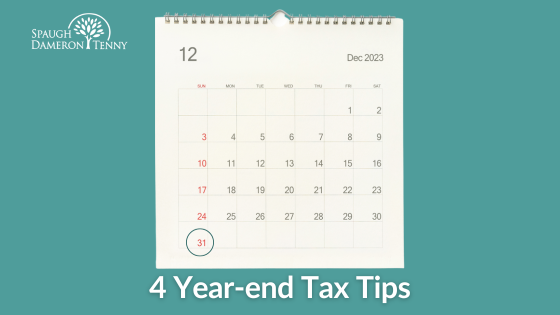
We're closing in on the end of 2023 and coming to you with some timely information. No, not how to save money on holiday shopping or avoid awkward conversations with family members at dinner. Let's talk about taxes.
Now, I know you probably did a giant eye roll, thinking, why am I reading this article? Can't we save taxes until February, March, or April of next year? The truth is: If you wait until then, it's too late.
Now is the time to try and make changes to improve your 2023 tax liability. Watch this video or continue reading this article to learn more about how you can help reduce your tax liability.
There is still time to help reduce your tax liability in 2023. Here are four quick ideas you can do — the first two have to do with saving money, and the last two have to do with giving money.
When it comes to saving money, one of the best places to try reducing your taxable income is the retirement plan available through your work. Often, this is a 401(k) plan.
It's essential to realize that the maximum amount the IRS will allow you to deduct from your income into a 401(k) is $22,500 in 2023, and that's if you're under age 50. If you have a 50th birthday before New Year's, you can deduct up to $30,000 of contributions to a 401(k) plan.
What do you do now?
Now, the second savings idea has to do with your children. If you're saving for college in a 529 college savings plan, several states around the country will give you a state income tax deduction for the deposits you put into a 529 plan.
You want to talk to your tax advisor or financial planner or do a solid and thorough Google search and see if you happen to live in one of the states that give a state income tax deduction. If you do, it may be the right time to make an additional lump sum deposit into those 529 plans before the end of the year.
This is also the time of the year when many of us think about engaging in charity or philanthropy. If you have an inclination in this regard, here are two more ideas.
There are things around your house that you no longer need, use, or want that are often worth more than you think.
Your CPA likely has a valuation guide, or you can Google search the Salvation Army's Donation Value Guide, and you may be surprised about how much those clothes, suits, pictures, household goods, and more are worth.
In many cases, donating the items you no longer use to a qualified charity reduces your taxable income dollar for dollar. And it keeps unused things out of the trash.
Finally, other than giving away our stuff, we often want to make cash donations to worthy charities and organizations. And might I suggest that if you and your family are of modest to high wealth, giving away appreciated assets is often a better strategy than cash.
This means if you have an investment account that's not in a retirement registration, an after-tax investment account with stocks or mutual funds, or exchange-traded funds that have gone up in value, talk to your CPA or your financial planner about giving away some of those appreciated investments to the charities that are important to you.
You'll end up with a better total tax deduction than had you just given away an equivalent amount of cash.
It's a bit of a complicated strategy, so you'll want to coordinate with the advisors in your life, like your CPA, accountant, and financial advisor, but definitely one you don't want to overlook as we approach the end of the year.
With only a tiny window before 2023 comes to a close, it’s the opportune time to review your financial strategies and take steps to minimize your tax liability.
If you have any questions about any of these ideas or other things money-related, don't hesitate to reach out to our team of financial planners. We are happy to help anytime.
CRN202611-5389820

Shane Tenny, CFP®, is the Managing Partner of Spaugh Dameron Tenny and a nationally recognized financial advisor. Since 2000, he has combined extensive financial knowledge with a passion for behavioral finance—helping clients make informed decisions based on both data and mindset. Shane often contributes to industry publications, appears as a guest on podcasts, and has been a leader in the financial planning field for years. He is known for making complex topics clear and practical for busy, high-income professionals seeking personalized advice they can trust.
Let me tell you about Judy O’Brien*.
Read More →Filing taxes is already complex — adding a state-to-state move can make things even more confusing. For physicians and dentists relocating for a new ...
Read More →When physicians accept a new role, especially with a hospital or healthcare group, they're often offered a signing bonus. What’s less obvious is that ...
Read More →